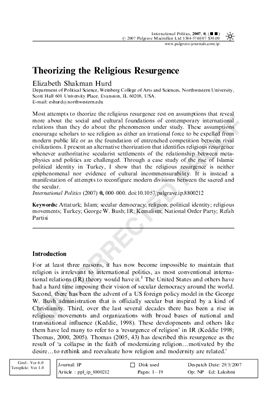Most attempts to theorize the religious resurgence rest on
assumptions that reveal
more about the social and cultural foundations of contemporary inteational
relations than they do about the phenomenon under study. These assumptions
encourage scholars to see religion as either an irrational force to be expelled from
mode public life or as the foundation of entrenched competition between rival
civilizations. I present an alteative theorization that identifies religious resurgence
whenever authoritative secularist settlements of the relationship between meta-
physics and politics are challenged. Through a case study of the rise of Islamic
political identity in Turkey, I show that the religious resurgence is neither
epiphenomenal nor evidence of cultural incommensurability. It is instead a
manifestation of attempts to reconfigure mode divisions between the sacred and
the secular.
more about the social and cultural foundations of contemporary inteational
relations than they do about the phenomenon under study. These assumptions
encourage scholars to see religion as either an irrational force to be expelled from
mode public life or as the foundation of entrenched competition between rival
civilizations. I present an alteative theorization that identifies religious resurgence
whenever authoritative secularist settlements of the relationship between meta-
physics and politics are challenged. Through a case study of the rise of Islamic
political identity in Turkey, I show that the religious resurgence is neither
epiphenomenal nor evidence of cultural incommensurability. It is instead a
manifestation of attempts to reconfigure mode divisions between the sacred and
the secular.

